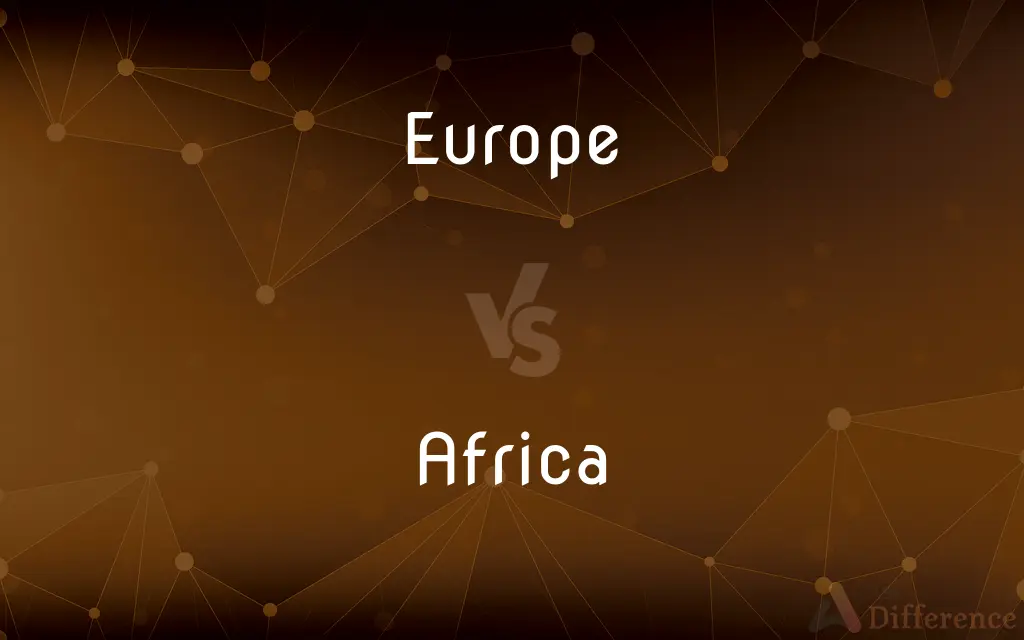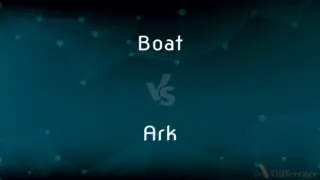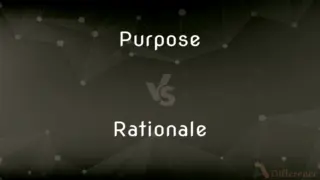Europe vs. Africa — What's the Difference?
Edited by Tayyaba Rehman — By Maham Liaqat — Updated on March 8, 2024
Europe is characterized by its diverse cultures and developed economies, while Africa is known for its rich biodiversity and varied landscapes.

Difference Between Europe and Africa
Table of Contents
ADVERTISEMENT
Key Differences
Europe, the second smallest continent, is known for its rich history and cultural diversity, with numerous languages and traditions across its countries. Africa, on the other hand, is the second largest continent, celebrated for its vast array of wildlife, ecosystems, and cultural heritage, with over 3,000 tribes and significant linguistic diversity.
Economically, Europe houses some of the world's largest and most advanced economies, including Germany, France, and the UK, with a high standard of living and strong infrastructure. Africa, while rich in natural resources, faces challenges such as poverty, political instability, and underdevelopment, though it also has rapidly growing economies like Nigeria and South Africa.
Geographically, Europe is known for its varied landscapes that include mountains, forests, and rivers, but on a smaller scale compared to Africa's expansive savannahs, deserts like the Sahara, dense rainforests, and large river systems such as the Nile.
Climate-wise, Europe experiences a range of climates from the Mediterranean to the Arctic. Africa is known for its hot climates, predominantly tropical, with deserts in the north and south and rainforests in the central region.
Despite their differences, both continents have faced and are addressing various environmental issues, from climate change and biodiversity loss to deforestation and pollution, showing that global challenges require collaborative efforts.
ADVERTISEMENT
Comparison Chart
Size
Second smallest continent
Second largest continent
Geography
Diverse, with smaller scale landscapes
Vast landscapes including deserts, rainforests
Economy
Advanced economies, high standard of living
Mix of rapidly growing and underdeveloped economies
Cultures
Rich history, diverse cultures and languages
Rich biodiversity, over 3,000 tribes, diverse languages
Climate
Range from Mediterranean to Arctic
Predominantly tropical, with deserts and rainforests
Challenges
Environmental issues, political unity
Poverty, political instability, environmental issues
Compare with Definitions
Europe
Home to the European Union, a unique political and economic union.
The European Union facilitates trade and mobility among its member states.
Africa
Known for its extensive biodiversity and natural landscapes.
Africa's Serengeti and Maasai Mara are home to some of the most significant wildlife migrations.
Europe
A continent defined by cultural diversity and historical significance.
Europe's history is marked by both unity and conflict, reflected in its many monuments and museums.
Africa
Hosts a mosaic of cultures and languages with deep historical roots.
Africa's cultural diversity is expressed through its numerous tribes, languages, and traditions.
Europe
Known for advanced infrastructure and high standard of living.
European countries often rank high in global quality of life indexes.
Africa
Features the world's largest hot desert, the Sahara.
The Sahara Desert is a vast and iconic landscape that shapes the climate and culture of North Africa.
Europe
Rich in artistic and architectural heritage.
Europe is renowned for its contributions to art and architecture, from ancient Greece to the Renaissance.
Africa
Faces significant development and environmental challenges.
Despite its rich resources, many African countries are working to overcome issues like poverty and deforestation.
Europe
Features a variety of climates from its northern to southern regions.
Northern Europe experiences cold Arctic climates, while Southern Europe enjoys a warmer Mediterranean climate.
Africa
Rich in natural resources, including diamonds, gold, and oil.
Africa's mineral wealth, particularly in countries like South Africa and Nigeria, plays a crucial role in its economies.
Europe
Europe is a continent located entirely in the Northern Hemisphere and mostly in the Eastern Hemisphere. It comprises the westernmost peninsulas of the continental landmass of Eurasia, and is bordered by the Arctic Ocean to the north, the Atlantic Ocean to the west, the Mediterranean Sea to the south, and Asia to the east.
Africa
Africa is the world's second-largest and second-most populous continent, after Asia in both cases. At about 30.3 million km2 (11.7 million square miles) including adjacent islands, it covers 6% of Earth's total surface area and 20% of its land area.
Europe
The 2nd smallest continent (actually a vast peninsula of Eurasia); the British use `Europe' to refer to all of the continent except the British Isles
Africa
The second largest continent; located south of Europe and bordered to the west by the South Atlantic and to the east by the Indian Ocean
Europe
An international organization of European countries formed after World War II to reduce trade barriers and increase cooperation among its members;
He took Britain into Europe
Europe
The nations of the European continent collectively;
The Marshall Plan helped Europe recover from World War II
Common Curiosities
What are some environmental challenges faced by both continents?
Both continents face issues like climate change, biodiversity loss, and pollution, though specific challenges can vary due to their different geographies and industries.
What distinguishes Europe's climate from Africa's?
Europe has a more varied climate, ranging from Mediterranean to Arctic, whereas Africa's climate is predominantly tropical, with large desert areas.
Can you explain the cultural diversity between Europe and Africa?
Europe's cultural diversity is characterized by its numerous countries and languages, while Africa's is defined by its vast number of tribes and even greater linguistic diversity.
How do historical events in Europe compare to those in Africa?
Europe's history is marked by events like the Renaissance, the World Wars, and the formation of the European Union. Africa's history includes ancient civilizations like Egypt, colonialism, and struggles for independence, shaping its modern landscape.
What role do Europe and Africa play in the global economy?
Europe is a major economic player with significant contributions to technology, finance, and manufacturing. Africa is a key source of raw materials and is experiencing growth in telecommunications, agriculture, and services.
How do educational systems in Europe and Africa differ?
European countries generally have well-established education systems with high literacy rates and numerous world-renowned universities. In Africa, education systems vary widely, with some countries making significant progress in literacy and higher education, while others face challenges related to access and quality.
What are the main languages spoken in Europe and Africa?
Europe has a wide range of languages, including English, French, German, and Spanish, among others. Africa is even more linguistically diverse, with over 2,000 languages, including Swahili, Arabic, Amharic, and Yoruba.
What are the dominant religions in Europe and Africa?
Christianity is the predominant religion in Europe, though it is home to a multitude of other faiths. Africa is diverse in religious beliefs, with Christianity and Islam being major religions, alongside indigenous beliefs.
How do the economies of Europe and Africa differ?
Europe's economies are generally more developed with a higher standard of living, while Africa includes both rapidly growing and underdeveloped economies.
What is unique about Africa's geography compared to Europe?
Africa boasts vast and diverse landscapes, including the Sahara Desert and dense rainforests, unlike Europe's smaller scale but diverse geography.
What are some of the most visited tourist attractions in Europe and Africa?
In Europe, popular attractions include the Eiffel Tower in France, the Colosseum in Italy, and the British Museum in the UK. In Africa, the Pyramids of Giza in Egypt, Table Mountain in South Africa, and the Serengeti National Park in Tanzania are highly visited.
How do the culinary traditions of Europe and Africa differ?
European cuisine is known for its diversity, from Mediterranean flavors in the south to Scandinavian dishes in the north. African cuisine varies greatly across regions, with staples like injera in Ethiopia, couscous in North Africa, and ugali in East Africa.
How does wildlife in Europe compare to Africa?
Europe's wildlife includes species like deer, wild boar, and various bird species, but it lacks the large mammals that Africa is famous for, such as lions, elephants, and giraffes, which roam its savannahs and forests.
What are the major political structures in Europe and Africa?
Europe has a mix of parliamentary and presidential systems, with the European Union adding a supranational layer of governance. African countries vary widely in political structures, with both democratic and authoritarian regimes, and the African Union working towards continental integration.
How do Europe and Africa address environmental conservation?
Europe has established numerous protected areas and environmental policies aimed at conservation and sustainability. Africa faces significant conservation challenges, particularly in protecting its unique wildlife and habitats, with efforts including national parks and international collaborations.
Share Your Discovery

Previous Comparison
Boat vs. Ark
Next Comparison
Purpose vs. RationaleAuthor Spotlight
Written by
Maham LiaqatEdited by
Tayyaba RehmanTayyaba Rehman is a distinguished writer, currently serving as a primary contributor to askdifference.com. As a researcher in semantics and etymology, Tayyaba's passion for the complexity of languages and their distinctions has found a perfect home on the platform. Tayyaba delves into the intricacies of language, distinguishing between commonly confused words and phrases, thereby providing clarity for readers worldwide.
















































